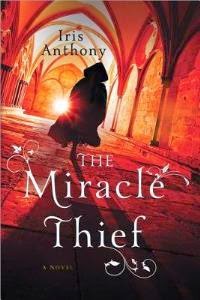These forthright words, spoken by a knight in Carolingian-era France (then called West Francia) in the year 911 AD, express a major theme of Iris Anthony's second historical novel. Everyone knows his or her place in this society and has only limited movement within it... and the era's women, whether royalty or peasant, have the most restrictive lives of all.
The Miracle Thief sheds light on women's stories at this dark and distant time through the viewpoints of three protagonists: a nun, a princess, and a pilgrim. Sister Juliana, perhaps the most relatable of the three to modern readers, doesn't believe her faith is strong enough to lead Rochemont Abbey after its previous leader's death. A former royal concubine now in charge of guarding a relic of St. Catherine of Alexandria, she struggles between her vocation and her fond memories of her previous relationship.
Gisele, the illegitimate daughter of King Charles the Simple, may have the harshest fate of the three. Thanks to a truce which her father isn't able to avoid, she's set to be married to Rollo, the pagan chief of the invading Danes. And the plight of Anna may be the loneliest and most desperate. Born with deformities to her hand and body, she can't escape people's belief that she's been cursed by God. When her mother dies, Anna takes to the road from Paris with her meager belongings, alone – something unheard of at this place and time – en route to Rochemont Abbey, high in the mountains of Burgundy, to pray to St. Catherine for a miracle.
This is a novel whose power builds slowly but steadily as the three women's stories draw together and they come to grips with the hands that fate has dealt them. The physical details weren't always vivid enough for me to visualize the locales clearly in my mind, although the setting has a basic medieval feel. A notable exception is Anna's arduous journey on foot – through calm and harsh weather, and with company both congenial and not. These segments also provide darkly humorous insight into the unofficial rules governing pilgrimages.
Anthony delves deeply into the emotional hearts of her characters, showing the small ways in which women could guide their own destinies at a time when society granted them very little. Another strength is her depiction of religion. It doesn't have a preachy feel, but faith in God guides everyone's decisions... well, everyone except the Danes, who live to conquer and pillage, and who will agree (like Rollo) to convert to Christianity if it gains them more power.
In the end, I enjoyed this elegantly written look at an era rarely depicted in fiction. The detailed character notes and author's note at the end add even more meaning to this thoughtful book.
The Miracle Thief was published by Sourcebooks in April ($14.99, pb, 384pp). Thanks to the publisher for granting me access via NetGalley.





No comments:
Post a Comment